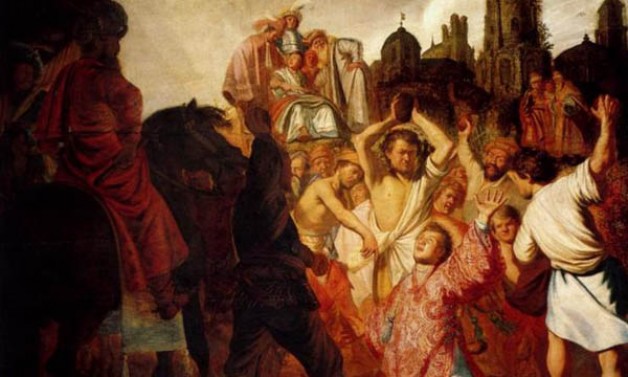Catholics that follow political, social, and cultural trends have seen many defeats in the last few years: the approval of same sex “marriage” in several states, the loss of Catholic adoption agencies, the HHS Mandate, the not so subtle threat of taking away the Church’s tax-exempt status, and so on. Compounding these defeats, there seems to be a trend among the younger generation away from mainstream Christianity and towards religious apathy. So, given the tangible political challenge and the apparent lack of concern for the Church’s position on religious freedom, many Catholics are taking Francis Cardinal George’s remarks from 2010 seriously:
I expect to die in bed, my successor will die in prison and his successor will die a martyr in the public square. His successor will pick up the shards of a ruined society and slowly help rebuild civilization, as the Church has done so often in human history.
In many of the conversations I hear on the topic of Catholicism in the United States, this quote is invoked. And it is almost always invoked with one of two problematic attitudes.
The first is unvarnished pessimism. This appears in people that remember the days of Catholic triumphalism. Their youth was spent amidst The Bells of St. Mary’s, I Confess, and the election of JFK. They watched Bishop Sheen on television. It’s been a rough transition from that world to one in which a sitting President criticizes the bishops directly.
The second attitude is found among a different sort of Catholic: he or she is usually younger and very serious about his or her faith. These are Catholics roughly 18-30, energized by the pontificates of Bl. John Paul II and Benedict XVI. They tend to repeat Cardinal George’s remark about martyrdom excitedly. They seem to think that the storm troopers will kick down the doors of the churches any day now and cart them off to be executed in public. And they think this will be awesome. And this will happen simply because they are serious Catholics. Occasionally one gets the impression that these people have already Photoshopped their own holy cards in preparation for their canonization.
Now, I want to be fair. The zeal of this second group could flow from a holy desire. These people could all be receiving the supernatural grace to desire martyrdom. The Blessed Mother in a vision did offer the young Maximilian Kolbe the red crown of martyrdom and the white crown of virginity. Like a champ, he took both. And now he’s canonized.
However, it is also possible that the zeal of the would-be martyr flows not from an active love, but from a self-centered passivity. While it is certainly good and noble to be willing to give one’s life for the Holy Catholic Faith, we cannot lose sight of the fact that martyrdom is a gift from God that is born of profound charity. It is a specific and glorious sharing in the life of Christ. But Christ died out of love as the fulfillment of an active public ministry. We do well to remember that verse from Revelation we pray so often at Vespers: “love for life did not deter them from death” (Rev 12:1). The verse does not read: “well, their lives were mediocre anyway, and losing them wasn’t that big of a deal.” Martyrdom is the crown of a life lived with ardent love for God and the people of God.
St. Stephen is an icon of this reality. He was preaching and working miracles right in the heart of Jerusalem. Here was a full apostolic life. So, his enemies hauled him in before the Sanhedrin on trumped up blasphemy charges. When they asked for an answer to the charges, he responded by giving them a very thorough explanation of the history of salvation. His accusers were so infuriated by his lecture that they stoned him. He was a deacon who taught and cared for the flock in Jerusalem and he was killed for it. He was martyred for his identity as a Christian, yes, but he was also killed because of the good apostolic work he was doing.
Consider one final analogy. A man may declare his love for a woman by saying he would die for her, and this is very heroic. But what is even more heroic is actually living for her. Mowing the lawn, working long hours to provide a good living, listening patiently when she’s irritated with you, picking up the socks off the floor, changing the baby’s diapers and remembering her birthday are all of a much more immediate significance than theoretically taking a bullet for her. The principle applies to our life with Christ: live for Him, and maybe, just maybe, he’ll give you the privilege of dying for Him.
✠
Image: Rembrandt, The Stoning of St. Stephen







